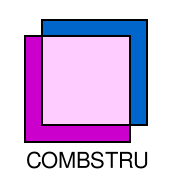COMBSTRU is a Research Training Network funded through the
European Commission, whose main scientific goal is the
analysis of intractable combinatorial problems, focusing on
structural properties of the problems and using tools from
algebra, logic, probability, geometry, statistical physics
and other fields. Training of PhD students and postdoctoral
researchers through appointed positions, workshops and
summer schools is a main issue in the network.
We announce a limited number of positions for young
researchers at pre- or post-doctoral level starting
September 2002, at the sites listed below.
Applicants wishing to apply to one of the sites should email
the contact person their CV (which includes academic degree,
previous research experience), and research interests/short
research plan along those indicated for the corresponding
network site.
Each applicant should indicate two persons who can provide
further information and/or reference.
The deadline for submitting applications is
june 15, 2002.
Please always send a Carbon Copy (CC) of your message
to Marc Noy <noy@ma2.upc.es> and to Jaroslav Nesetril <nesetril@kam.mff.cuni.cz>
The appointments will be evaluated by COMBSTRU
representatives and the applicants will be notified by
JUNE 30, 2002.
Appointments can be made up to a maximum of 3 years,
although normally are intended for 1 or 2 years.
Appointments for less than one year will be
considered too.
Post-doctoral salaries are based on EU recommendations for
Marie Curie Fellowships. Please check in advance required
conditions for eligibility at
www.cordis.lu/improving/fellowships/home.htm.
1. Barcelona. UPC
Marc Noy <noy@ma2.upc.es>
- Algorithms and Computational Complexity
- Graph Theory and Networks
- Matroid Theory and Algebraic Combinatorics
- Computational and Discrete Geometry
2. Berlin. Freie Univ., Humbodlt Univ. and Tech. Univ.
Helmut Alt <alt@inf.fu-berlin.de>
- Combinatorial Geometry
- Computational Geometry
- Network algorithms
- Random graphs and structures
- Randomized algorithms
3. Bielefeld. Bielefeld University
Rudolph Ahlswede <ahlswede@mathematik.uni-bielefeld.de>
- Computational Complexity
- Extremal Combinatorics
- Information Theory
4. Bordeaux. LABRI, Univ. Bordeaux I
Andre Raspaud: raspaud@labri.fr <raspaud@labri.fr>
- Graph colourings, homomorphisms, flows
- Graph algorithms
- Compact graph representation
- Graph drawing, labelling, and visualization
- Routing, communication networks, network design
- Distributed computing
5. Budapest. Renyi Institute (Hungarian Academy
of Sciences) and Eotvos University
Ervin Gyori <gyori@renyi.hu>
- Extremal combinatorics
- Probabilistic methods and random structures
- Graph theory
- Computational and discrete geometry
- Algorithms
6. Oxford. Oxford University
Dominic Welsh <dwelsh@maths.ox.ac.uk>
- Complexity and algorithms
- Graphs, particularly counting and randomness
- Matroids, particularly polynomials
7. Patras. CTI
Paul Spirakis <spirakis@cti.gr>
- Fundamental Aspects of Communication Networks
- Algorithms and Complexity
- Randomized and Combinatorial Techniques
8. Pisa. CNR-IMC
Marco Pellegrini <pellegrini@imc.pi.cnr.it>
- Complexity and algorithms
- Computational Geometry
- Counting problems
9. Prague. DIMATIA, Charles University
Jiri Matousek <matousek@kam.mff.cuni.cz>,
Jaroslav Nesetril <nesetril@kam.ms.mff.cuni.cz>
- Structural combinatorics
- Probabilistic method
- Computational and discrete geometry
- Graph theory
- Extremal problems
- Complexity and algorithms
Last updated by:
Jan Hubicka
(hubicka@kam.ms.mff.cuni.cz),
16-Oct-2002

